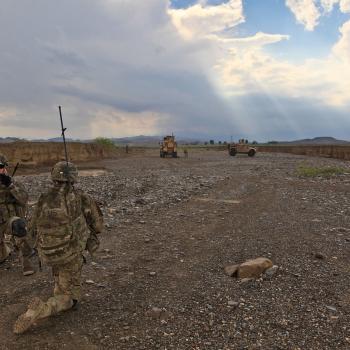 Monday: Read Rom 4:1-25
Monday: Read Rom 4:1-25
Paul’s argument in Romans centers on the fact that God was faithful to His promises to Abraham through the faithfulness of Jesus Christ—by His death! (3:21-25). Paul’s argument is steeped in creation. In Romans 1, he points out that God created humanity to reflect his image and glory to the creation. But instead of reflecting God’s glory, humanity chose to reflect its own image. Paul notes in Romans 2 that the chosen people of God were no better. The solution: Jesus (3:22)! He was the faithful Israelite and did was humanity could not do. What does all of this mean for Abraham and his descendants?
It means that God was faithful to His promises and that Abraham has become the father of all who believe (4:11). The promises to Abraham and his descendants were fulfilled in Jesus and all who believe have become Abraham’s children.
Questions to ponder/discuss:
- One of the difficulties in reading Romans 4 in English is the fact that the words righteousness and justification come from the same root in Greek. So also, the words for faith and belief come from the same root in Greek. This means that when Paul cites Gen 15:6 “Abraham believed God and it was reckoned to him as righteousness” in Rom 4:9, he is using the same words as when he talks about how God will justify the gentiles by faith (see: Gal 3:8).
- Read Romans 4 and underline or highlight every time Paul uses righteous(ness), just(ify), faith, or belief.
Tuesday: Read Rom 5:1-21
It is important to read Romans in light of the creational theme. Paul draws out the contrast between Adam and Jesus: death comes to all through one man (Adam); so also, the resurrection of the dead comes through one Man: Jesus! NT Wright suggests that Romans 5-8 essentially addresses the same argument as in Romans 1-4 but this time Paul does so by retelling the story of Israel. This story will reach its’ climax in Jesus (8:3-4).
Perhaps the key is found in 5:21: “as sin reigned in death, even so grace would reign through righteousness to eternal life through Jesus Christ our Lord.”
Questions to ponder/discuss:
- Note that “justified” (5:1) does not mean that we are holy or righteous as so often has been taught. It is used here by Paul as a legal term: we have been acquitted. But that doesn’t make us “righteous” in the sense of our moral being. We still have to do the work of becoming holy.
- Read the list of present blessings for those who have been justified by Christ in 5:2-4. What strikes you the most? What gives you hope?
- The ethic of the NT is that we are to love as Christ loved us. We are to carry our crosses and die for the sake of the nations just as Jesus did. Roman 5 makes it very clear that Jesus did this for us while we were His enemies (6, 8, 10). What does this say for the kind of love we are to have toward others?
- Read 5:11-20 and make a list and note the comparisons/contrast between Adam and Jesus
Wednesday: Read Rom 6:1-14: see Gal 2:15-21
Since baptism symbolizes our death and resurrection, we are not to live in sin because that is part of the old life to which we died (1-4). Paul then argues that what is true of Jesus is also true for those who have been baptized in Him (5-8). As a result, we shall live as dead to sin and alive to Christ (9-11).
The “therefore” in 6:12 drives this point home. Because we have died to sin and risen to a new life in Christ, then . . . (see 12-23).
Questions to ponder/discuss:
- Baptism is based on the death and resurrection of Christ. It symbolizes our new birth in Christ and our death to our old self.
- Sadly, baptism, like so many other issues in the church, has been a matter of debate and division within Protestantism. Essentially there are two main positions.
- Some argue that baptism is a sign of the new covenant just like circumcision was a sign of the old covenant. In this view, baptism simply identifies one as a member of the covenant. Just as a child in the OT who was circumcised had to grow and be obedient to the covenant, so also a child who is baptized in the covenant community must also grow and become obedient.
- Others contend that baptism is a public profession of one’s faith. Those in this camp suggest that it should only be reserved for professing believers.
- Paul’s point is to remember your baptism (regardless of when it occurred). It signifies that we have died to our old life and have risen to a new life in Christ.
- When times are tough, remember your baptism!
Thursday: Read Rom 6:15-23
Paul continues the argument that we have died to sin. He then contends, “You are slaves of the one whom you obey” (16). The Christian life is a constant struggle between our old life of sin and our new life in Christ.
NT Wright suggests, “If someone challenged [Paul] and said that sin and death were just as powerful to them as they had been before their coming to faith, he would reply that they had not yet considered the seriousness of their baptism; just as if someone claimed that, now they had been baptized, evil had no attraction whatever for them, he would no doubt reply that they had not yet considered the seriousness of sin’ (Wright, Romans, 541).
Note that Paul continues the discussion with: “thanks be to God” (17).
Questions to ponder/discuss:
- Although it is true that the Christian life is a constant struggle between our old life of sin and our new life in Christ, this point is too often used to justify sinful living. Paul would have nothing to do with such reasoning. His answer is clear: we died to that. And we are slaves of the one whom we obey.
- If you are struggling with sin, consider the following:
- Ask the Holy Spirit to empower you daily to live in accord with your new self in Christ. Regular and consistent prayer is critical.
- Encourage others to be praying for you and that the victory over sin in Christ will reign (I do not intend to suggest that we will be completely victorious at all times).
- Find someone that you can confide in. Following Christ was never meant to be done alone. Meet with them often.
Friday: Read Rom 7:1-25
This chapter is often misunderstood. The key is that Paul is telling the story of Israel with the climax in Jesus (7:25; 8:3-4). In Romans 7, Paul is continuing the topic of whether or not we are under sin. His answer is that we died to sin. And just as death cancels all contracts (like a marriage contract), so also, our death to sin has canceled that contract.
Paul’s use of “I” in this chapter is likely a reference to human nature, or more precisely the ‘I’ is Israel. That Paul was giving a first-person account of his struggle with sin does not make any sense here. He has already argued that he died to sin!
Michael Gorman reminds us that in Romans 7: “Paul pronounces the law good and holy. Paul depicts Sin as a force or power that makes use of—even hijacks—the good law. Sin enslaves and indwells people” (Gorman, Romans: Loc 4130).
What is the solution to the problem caused by sin? Paul concludes, “thanks be to God through Jesus Christ” (25)! Chapter 8 will continue to expand on this with reference to the coming of the Spirit.
Questions to ponder/discuss:
- It is critical to note that we have overcome sin through Christ! The key, as we will see in Rom 8:1-4, is that we must walk by the power of the Spirit.
- If you do not have a spiritual mentor, then pray for the Lord to send someone and then discern who it is that He has sent. (Ask your pastor or a leader that you trust to help you find someone).
NB: our goal is to keep these posts free of charge. I do not intend to ever hide them behind a paywall. I can only do this if those of you who have been blessed by them and can afford to give ($5, $10, $25, or more/month) do so. You can give a tax-deductible contribution by following this link.
Please share this post and let others know about determinetruth.
If you wish to view this blog on your smartphone through the Determinetruth app simply download the “tithe.ly church” app on your smartphone and insert “determinetruth” as the church name you wish to follow. Once it is loaded, simply click on the “blog” icon and it will automatically load.
If you would like to have Rob speak at your church or organization in person or via zoom, please let us know by filling out the contact info on the Contact me tab on this site.
[1] This guide is meant to be done either as a group study over the course of 2 or 4 meetings (Day 1-5; 6-10; 11-15; 16-20), or as a private devotion over the course of 4 weeks (or a calendar month—5 lessons per week).

















